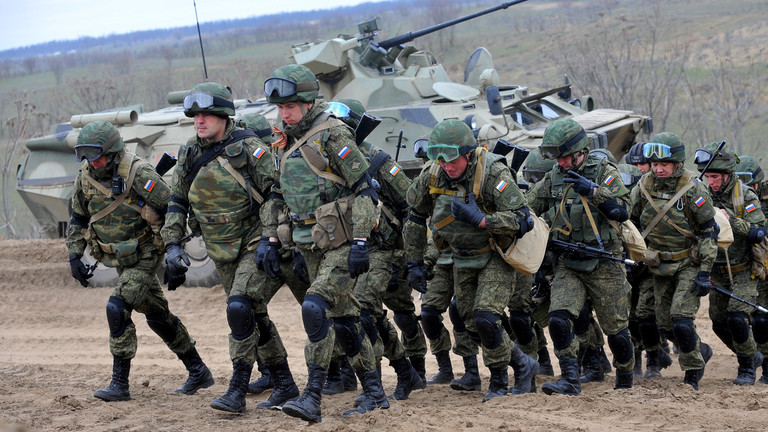“There are Russian troops on the territory of the Russian Federation next to the Ukrainian borders. And we find it necessary to keep those troops there in front of the very tense situation and very unfriendly environment,” he stated in an interview with CNN.
In a situation when NATO is staging various military drills and is moving its military infrastructure moving towards Russia’s borders our borders, “we have to respond, we have to take measures of precaution, that’s why we have our military guys on our territory there,” he noted.
Recently, Western countries and Ukraine have been speaking about Russia’s possible aggression against Ukraine. Peskov earlier slammed such statements as hollow and groundless with the intention of fanning tensions. He stressed that Russia is a threat to no one but did not rule out possible provocations to justify such statements and warned that attempts at using force to settle the crisis in southeastern Ukraine would have the most serious consequences.
Russia is threatening no one with military actions over Ukraine but will be ready to take countermeasures if need be, Peskov stated.
“No one is threatening anyone with military actions. This will be just a madness to do that. But we will be ready to take counteractions,” he noted, commenting on the host’s remarks that Russia is allegedly threatening with military actions because of the situation in Ukraine.
However, according to Peskov, Russia “will have to do something,” if NATO ignores its concerns and continues to move its military infrastructure closer to the Russian borders.
Russia has no troops either in Donbass or in Ukraine, Russian troops are deployed only on Russia’s territory, Peskov said.
“There are no Russian troops in Ukraine. There are no Russian troops in Donbass,” he continued, adding, “There are Russian troops on the Russian soil, on the Russian territory next to the Ukrainian border.”
NATO is a weapon of confrontation rather than a tool of peace and stability and it is getting closer and closer to the Russian borders, he noted.
According to the Kremlin spokesman, the current situation did not develop overnight, it has been developing for decades.
“In our understanding, NATO is an organization that was tailored and was created for confrontation, not for defense,” he said.
“NATO is not a dove of peace, not a dove of stability, not a dove of prosperity. NATO is a weapon of confrontation. And this weapon of confrontation with each year started to get closer and closer to our borders,” Peskov noted, adding that Russia has been observing “the gradual invasion of NATO into Ukrainian territory with its infrastructure, with its instructors, with supplies of defensive and offensive weapons.”
“And that brought us to the red line that brought us to the situation when we could not tolerate it anymore,” he stressed.
Relations between Russia and NATO has approached the red line due to the alliance’s movement in Ukraine, Peskov said.
“With the time being, we have seen the gradual invasion of NATO into Ukrainian territory with its infrastructure, with its instructors, with supplies of defensive and offensive weapons. And that brought us to the red line that brought us to the situation when we could not tolerate it anymore,” he stressed.
“And that was the main reason for President [of Russia Vladimir] Putin to say: ‘Guys, this is a real threat for us. And this is a real threat for stability and security in European architecture. Let’s find a way out, let’s produce some guarantees for us, let’s think about returning NATO’s military infrastructure back to the borders of 1997, let’s get rid of the idea of Ukraine’s membership in NATO and also let’s get rid of the idea, let’s abandon the idea of the deployment of any offensive weapons on the territory of Ukraine next to our borders,” he added.
The new proposed US sanctions, including against the Russian leadership, may break off all relations between the two countries, Peskov stated.
“Of course, it’s beyond our understanding,” Peskov noted, referring to some of the latest US proposals that call for sanctions against the Russian leadership.
“Potentially this kind of sanctions can lead to discontinuation of any relations between our two countries,” which won’t benefit either Moscow or Washington, he continued, adding, “It would be a great mistake.”
The Kremlin spokesman said Russia isn’t afraid of sanctions.
“To some extent we are trying to take advantage of them in terms of developing our domestic economy, our domestic production,” he noted, adding, “We are quite big and quite self-sufficient to be fragile against these sanctions.”
Peskov said sanctions never succeeded in making countries change their course.
“Can you recall any example of a situation when sanctions helped you to solve a problem? Where sanctions were really effective in making a country to make certain steps?” he asked, adding, “It’s never happened.”
On Wednesday, a group of Democrat legislators led by Senator Bob Menendez introduced a bill to the US Senate on restrictions against Russia if tensions around Ukraine escalate. Titled Defending Ukraine Sovereignty Act of 2022, it involves, among other things, sanctions against Russian President Vladimir Putin, the prime minister, heads of the Foreign Ministry, the Ministry of Defense, the chief of the General Staff of the Russian Armed Forces, and other members of the military leadership. In addition, restrictive measures may affect the Nord Stream 2 gas pipeline.
To come into effect, the bill should be approved by both houses of Congress and signed by the US President. Emily Horn, spokeswoman for the White House National Security Council, announced earlier that the US administration supports the proposed legislation.
